The following is a lightly-edited reprint of an essay I’d first published on Medium some 4 1/2 years ago. I’m republishing it here largely because it provides some background and insights into my ongoing study of categories, as well as into some future posts, and how they are relevant to many social issues, the most salient of which is, of course, transgender ideology.
But one notable place where the rubber meets the road — though a quite illuminating if disconcerting one — is in the too-common but profoundly unscientific article of faith that “sex is immutable”, that every last human is “sexed”, is either male or female — from birth to death. So help us Gawd and strike dead those who say otherwise. Sadly, most people are ill-equipped to handle any challenges to those particular “catechisms” and react in a seriously “offended” manner — to say the least — at any even oblique suggestion that significant portions of humanity are, in fact, “sexless”, are neither male nor female.
However, to be fair, to give the devils their due, the “premises” undergirding those articles of faith, or rather the misuse of them, are not easily elucidated or readily grasped — it’s taken me several years of struggle, of frequent two-steps-forward and one-back, to acquire any sort of tenuous handle on the underlying principles, mostly of categorization, by which we might separate wheat and chaff. Moot of course exactly where my own “pilgrim’s progress” started from, but there have been a number of welcome and noteworthy signposts along the way, one of the earliest of which may have been a passage in Steven Pinker’s How the Mind Works:
“An intelligent being cannot treat every object it sees as a unique entity unlike anything else in the universe. It has to put objects in categories so that it may apply its hard-won knowledge about similar objects, encountered in the past, to the object at hand.” [pg. 12]
More recently, a somewhat more succinct and detailed summary of the problem and a possible path to a solution was afforded by the “About” section of a Facebook post by Scott Alexander, currently writing at
— a Substack well-worth following:Scott Alexander is a psychiatrist and the creator of Slate Star Codex. [It] is a blog where topics tend to center vaguely around meta-philosophical ideas of how people evaluate arguments for their beliefs, and especially whether this process is spectacularly broken in a way that may or may not doom us all.
“Doomed”, indeed. As I discuss in the following, Scott had an illuminating post some 8 years ago — The Categories Were Made For Man, Not Man For The Categories — which likewise had a seminal influence in understanding the relevance and utility of categorization in that essential process of “evaluating arguments for our beliefs”. BTW, the “Hair Dryer Incident” in that article is worth the price of admission by itself.
In any case, without further ado, my original Medium post with a few annotations and corrections:
“How mad” indeed that such simple statements of fact — or at least of such fundamental and categorical definitions — should be considered “controversial”. So “controversial” in fact that it led to a complaint against the UK “Advertising Standards Authority” as being tantamount to “transphobic hate speech”, a complaint that was rather tame in comparison to many other responses.
[Corrections Y180923 below]
But one might reasonably ask, what “heresies” are entailed by such an apparently innocuous assertion, and whose knickers are in such a twist as to cause such “intemperate” responses? Unfortunately or not, it seems that it’s not just the transwomen — the usual suspects — who are most up-in-arms at that statement, although in passing one might concede that they have, maybe to some lasting benefit, most starkly outlined the roots of a more general problem. But no, they’re most certainly not the only ones that deserve to be in that docket. More or less equally contributing to the problem are many intersex “women”, and many others with more justified, if ephemeral, claims to the title who are “nonplussed” — at best, if not deeply offended — that the ramifications of the consequential definition for “female” — i.e., “produces ova” — currently or will eventually exclude them as well from that exalted state once they reach menopause.
And since those responses seem to lie at what one might reasonably call the rotten heart of the whole transactivist movement — at the rotten heart of the rather decidedly odious and mephitic efforts to dupe naïve or autistic children into surgically or chemically mangling their genitalia, their “secondary sexual characteristics”, and their reproductive capabilities, all largely because we have carelessly or fraudulently conflated sex and gender; and, likewise, at the equally rotten heart of the egregiously problematic attempts to promote “self-ID” by the UK’s Gender Recognition Act which is set to “privilege individual feelings above objective reality” — one might reasonably ask how those responses to such basic definitions have motivated and laid the foundations of such pervasive if not life-and-society-threatening rot.
But in some sense, the “blame” for those responses can largely be laid at the doorstep of society in general (we have met the enemy and he is indeed us), and, more particularly, at those of the educational system for a failure to educate its citizens in reasonable levels of reason and logic — “a failure to communicate” writ large. And, as something of a case in point, the “feminist critics” who reviewed Daphne Patai’s and Noretta Koertge’s rather damning “Professing Feminism” noted that:
“the authors wrote of the isolationist attitude that dominates many of the programs, along with a virulent anti-science, anti-intellectual sentiment driving many of the professors, staff and students” of many “Women Studies departments in the United States.”
Now one can reasonably ask, should urgently ask, particularly as the hour is getting rather late, what are the reasons for that state of affairs? Is it just the encroachments of the “philosophy” of postmodernism that is the primary culprit, the primary cause of that “anti-science & anti-intellectual sentiment”? Is it the “Evangelical Rejection of Reason” by a gawd-besotted public? The “Coddling of the (Righteous?) American Mind” (setting up a generation for failure, even if it’s the failures of previous ones that might be construed as more relevant and the topic de jour)? Regardless of the specific cause or combination of causes, it is hard not to be apprehensive that, as the American psychiatrist Scott Alexander phrased it:
“how people evaluate arguments for their beliefs … [is a process that may be] spectacularly broken in a way that may … doom us all”
“amen” to that.
However, as even taking a cursory stab at answering those questions would likely lead us into the woolier, thornier, and more abstruse regions of philosophy — as the previous citations would suggest — which I’m not at all qualified to address, it seems more useful to focus on the specific cases where so many are going off the rails and into the weeds — and in rather astounding and spectacular fashion. And to then see how they pertain to that general failure to “evaluate arguments” by using a rational and coherent methodology. And, in the furtherance of which, I’ll argue that those spectacular “accidents” are largely due to a profound misunderstanding about how categories work, the philosophical and logical principles behind them, and about the basis for their creation.
Usual & Unusual Suspects:
And first up in the docket is Zinnia Jones, a transwoman (compound word like “crayfish” which ain’t) who claims that “Medical professionals increasingly agree: Trans women are female, trans men are male”. However, a close perusal of Jones’ article makes it manifestly clear that those “professionals” — one uses the term loosely — are more or less using, if rather sloppily, “male” & “female” as genders":
Transgender woman (also: trans woman, male-to female, transgender female): This refers to individuals assigned male at birth but who identify and live as women.
“transgender female” being rather clearly an entirely different kettle of fish from an actual biological female which has a rather precise definition — which most definitely does not encompass penis-havers.
Addenda Y230217A: As I indicate later, Merriam-Webster endorses something in the way of a consensus on the use of “man” and “woman” as genders, as rough synonyms for what boils down into personalities and personality types. However, as Matt Walsh tweeted some 7 months ago, they have recently crossed the Rubicon themselves by endorsing the rather circular definitions of “male” and “female” as genders/gender-identities. Houston, we have a problem ….
But, as another of the usual suspects, consider first the rather brave claim of one Avery Edison and my response (for which he subsequently blocked me; apparently no courage in his convictions):
Of maybe some interest is the link in the second capture which is to the article on — gawd help us all — the Gender of connectors and fasteners (who knew, as per the Merriam-Webster quote above, that connectors had personalities? Like fish? … 🙄)
And then there is a further article from Jones — Stop Calling Trans Women “Male” —where he expresses some peevishness because he isn’t having much success peddling that schlock, before crossing the Rubicon in style and unequivocally hoisting his flag, “Trans women are female”.
However, to give the devil his due, Jones’ argument (in that last link) does (briefly) hold a bit of water — before exposing itself as, largely, incoherent twaddle — but he does highlight or suggest, even if inadvertently and incorrectly, the issue and nature of categories — which is fundamentally the crux of the matter. And a particularly illuminating statement from the first of his links (“Medical professionals”) and which, somewhat amusingly but usefully, links to that somewhat iffy though generally helpful article by Scott Alexander on categories:
The application of the labels “female” and “male” to trans people is a matter of flexible personal choice, not a matter of indisputable physical facts like having a prostate. No inherent meanings of the terms “male” or “female” are built into the structure of the universe; it cannot be said that it is somehow factually incorrect to call trans women female. A choice of definition may be more or less useful for a given purpose … but it is still ultimately arbitrary.
But while one might reasonably concede that Jones is quite correct that the universe has no inherent meanings for the terms “male” and “female”, it is not at all a case that the choice of definitions is entirely arbitrary: there are some rather “brute” facts that undergird and motivate those choices which he, rather clearly, would like to sweep under the carpet. Consider the lead few sentences in the Wikipedia article on taxonomy:
Taxonomy … is the science of defining and naming groups of biological organisms on the basis of shared characteristics. Organisms are grouped together into taxa (singular: taxon) and these groups are given a taxonomic rank; groups of a given rank can be aggregated to form a super-group of higher rank, thus creating a taxonomic hierarchy. The principal ranks in modern use are domain, kingdom, phylum (division is sometimes used in botany in place of phylum), class, order, family, genus and species.
Which provides the justification for arguing that the process of choosing names for categories — groups which have “shared characteristics” — is largely if not entirely based on the number of individuals in a given population — ALL animals, ALL humans, ALL chemical compounds, etc., etc., etc., although we generally don’t name every individual in a population as in, for example, every colour in the rainbow. But that naming is also based on rational subsets and hierarchies of those populations, and on particular contexts — e.g., which types of environments different species of organisms are found in.
But it seems rather clear to me that, in the context of reproduction (a fairly important concept and process, one might tentatively suggest), a rather large percentage of the population of humans — of most if not all plants, insects, birds, and animals as a matter of fact — share the characteristic of producing the gamete known as ova, and that a more or less equally large percentage share the characteristic of producing the gamete known as sperm, and that a rather large though unknown percentage in each species produce neither and therefore cannot take part in the process of reproduction.
Which, mirabile dictu, are precisely the definitions for the (exhaustive) categories (no exceptions) “female”, “male” and “infertile”. Graphically, though maybe not proportionally:
Sure rather odd, at best, that so many people seem to have so much difficulty accepting that, reproductively speaking, humans, most species as a matter of fact, can be partitioned into the categories “fertile” and “infertile”, and that the former can be further partitioned into the sub-categories of those who produce sperm and those who produce ova. Maybe, given their ubiquity and the size of the subpopulations, we could eventually get around to naming them? …
So while Jones may wish to and is welcome to use his own idiosyncratic definitions of “female” — although I doubt he’d be terribly happy with “having concave mating surfaces” — part of the social contract, part of the structure undergirding the entire process of communication on which civilization crucially depends, is that we use agreed upon definitions for words. Kind of like deciding which side of the road is the right one to drive on; somewhat arbitrary which side we choose, but there IS some utility and value in everyone being on the same page. Likewise with the definitions for the sexes where there is clearly a great deal of justification for using the biological ones noted above.
Though, somewhat parenthetically, that does raise the question of why he and the rest of his transwoman tribe are, apparently, so very desperate to use “female” to describe themselves when they clearly reject the definition that everyone else has in mind. One might suggest that if, today, the rest of us were to define a brand new word, say, “ovaprducr” as “produces ova” and attach as much cachet to it as now attends “female” then I expect that tomorrow he and the rest of his tribe would be clamoring to be included in that class. Maybe an understandable motivation — “The Spy Who Came In From the Cold” — but one clearly not based on facts.
However, while the perspectives and motivations and actions of transactivists are, of course, crucial factors contributing to the mess we’re in, they’re not the only ones. And it seems that one might reasonably argue that some rather large groups of women — nominal and otherwise, feminists and anti-feminists — also contributing substantially to that mess — and, one might suggest, in large part due to outright vanity: “vanity, vanity, all is vanity” — saith the preacher.
Intersex “women” take the stand:
And, first up in the docket on that charge is the intersex “woman” “Mrkhtake2” who likewise boldly, if foolhardily and absent any evidence, stakes her claim to being female:
[Correction Y180923: some credible evidence to justify Mrkhtake2’s claim to being a female — by the standard definitions on the table — has subsequently come to light which justifies a retraction of sorts: mea culpa, shoot me at dawn. However, the following more or less stands as written since she apparently still thinks that the “denoting” of the OED definition refers to the karyotype of the individual and all of their cells. And, despite looking rather closely in between the lines written — high-powered magnifying glass and all, I can see absolutely no indication whatsoever that that is part of that definition.
While one might reasonably question whether any particular definitions on the books are credible or useful or consistent with other facts and definitions, one might suggest that they are reasonable starting points, and that they should hold sway until such time as they are proven to be null and void. Rather like the parallel postulate of Euclidean geometry which held sway for some 2500 years until Einstein’s theory of relativity was proven to be a more accurate representation of “reality”.]
Addenda Y230217: Sadly, Mrkhtake2’s tweets, and mine, are long gone — techbros at Twitter have yet to reinstate either of our accounts — but the thread may still provide some illumination, and the author’s blog is still extant and worth a gander or two.
But there are many more intersex activists who are likewise desperate in their insistence that everyone is either male or female.
But while I also have to give the devil her due in her case as well — she is apparently quite knowledgeable about the biology of intersex conditions (though “a little learning is a dangerous thing” has some relevance), and is quite passionate about and justified in defending intersex rights — she also, by way of taking a shot or two at yours truly, in effect refuses to consider the standard definition for “female” (“produces ova”):
Christ in a sidecar. For one thing, that is the nature of categories — they are, by definition, categorical. For example, “teenager”, by definition, excludes those who are under 13 and over 19 years of age. And for another, you can’t talk about “female biology” unless you have defined “female” in the first place which neither she nor Jones have ever done — might I suggest replacing that phrase with “the biology of those who produce ova”?
But more particularly, she prefers instead to engage in obfuscation, prestidigitation, and the waving about of largely irrelevant concomitants of that attribute, all despite having that (Oxford Dictionary of Biology) definition laid out in front of her, and by a philosopher (Patrick Killeen), no less:
Women and Their White Knights In The Hot Seat:
And that — “individuals whose reproductive organs produce only [ova]” — brings us around to the last of those charged, i.e., a rather large contingent of actual or presumptive women and the many male “feminists” who do sterling service defending their “honor”. And many, although not all, of those possessing or having possessed such (functioning) “reproductive organs” react rather illogically if not badly to the consequential implication that those who are no longer capable of producing such gametes aren’t technically “entitled” to membership in said classes:
That — “Terfy” — is what the definition is: can’t produce ova, don’t qualify as female and therefore not as a woman. Kind of like actually having to be between the ages of 13 & 19 (inclusive) to qualify as a teenager.
Heather: if your hysterectomy entailed the removal of ovaries — not all do — then, ipso facto, you couldn’t produce ova so you don’t qualify as either “female” or as “woman”. But “woman” isn’t an identity — it is ONLY the label for a particular set of attributes that denote membership in a class or category: {adult, human, female}, ergo: “woman”. Kind of like being, say, blue-eyed or teenager: lose the attribute, lose the right to claim membership in the corresponding classes.
And then there was a veritable phalanx of “white knights” — apparently — who at least tried gamely to salvage the claims of people without any (functioning) gonads — the organs that actually produce gametes — to the classes “male” and “female”; a representative of the tribe:
So — “BigDTwo” — because a baby is “potentially” a teenager, you would still put it in that class? You have to actually possess and share a characteristic to be included in the class or category of those who do likewise.
Parenthetically, the “categorization” quote above is from columnist Barbara Kay’s Diluting the meaning of ‘woman,’ to appease transgender activists, is misogyny. Although she never does define “woman” herself which is rather decidedly “problematic”. The transactivist crowd are making an egregiously bogus claim on the word, but unless “we” draw a line in the sand and stipulate a non-negotiable alternative — which @HumanFemales [apparently Posie Parker’s old StandingForWomen account] has clearly and commendably done, we are just giving free rein to the transactivists to continue with their depredations.
Summation to the Jury:
But that, ladies and gentlemen and otherkin of the jury, is largely the case against, primarily, the transactivist crowd. However, it is also the case against many outside of it who, by their ignorance about the nature and use of categories, or by their vanity or misplaced sense of identity — “I am (forever) Woman! Hear me roar! 🙄” — allow the transactivists to steal a march on the rest of us — causing no end of grief to many, particularly to vulnerable children.
But my use of “otherkin” above suggests another aspect of the problem which may be a bit more intractable, and not quite so easily elucidated, much less rectified. Which is that society’s general and quite common insistence that people have to be of one sex or another — instead of accepting that a great many people are of neither sex — would seem merely to give some motivation to those who, quite understandably not wishing to be left out in the cold, make problematic claims on membership in categories that are not at all justified by the scientific facts on the ground.
Addenda Y230216: Those “facts” being, most saliently, the biological definitions published in the Journal of Molecular Human Reproduction:
And an additional problematic aspect is our general reluctance to not only differentiate between sex and gender but to stand against their conflation, a “crime” that many of those commendably battling the Gender Recognition Act [“self-id”] certainly aren’t guilty of:
But one of the worst effects of that conflation is that it just opens the door to those who would peddle the “born in the wrong body” “solution” to those suffering from “gender dysphoria”.
And while one credible definition for gender — “the behavioral, cultural, or psychological traits typically associated with one sex” — may be little better than a synonym for “personality”, it would still seem to define a useful category, one that encompasses a spectrum — so to speak — of characteristics shared by significantly large subsets of the population. And characteristics that are notably different from the bare facts of which types of gametes we do or don’t produce, of which reproductive classes we’re members of (male, female, infertile).
But the solution to a great many of our social and medical problems — for examples, segregation and affirmative action policies, and pharmacological sensitivities based on significant physiological and psychological differences by sex — all depend on having clear and unambiguous definitions for the categories in question. Categories, in general, truly are the foundations of our civilization, and of the science on which it depends; allowing them to become corrupted for political or trivial personal reasons tends to have problematic consequences — as the historical record illustrates in some detail:


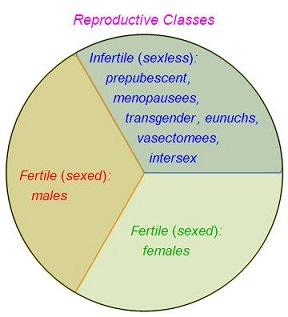
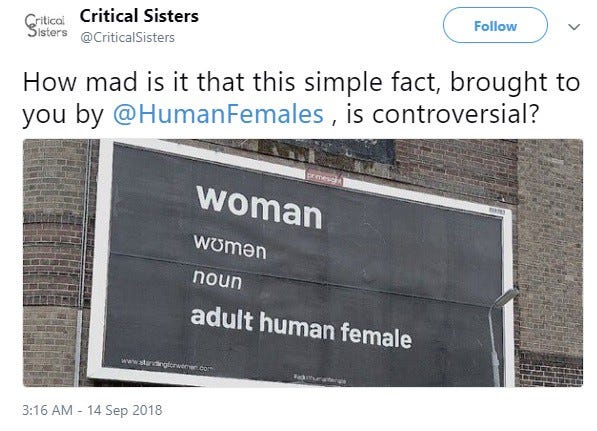

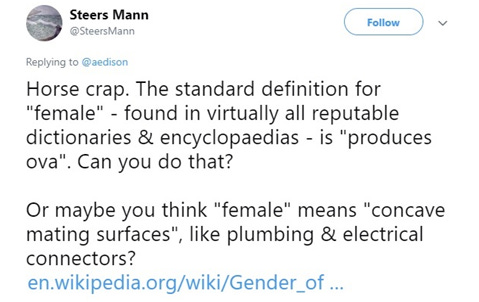
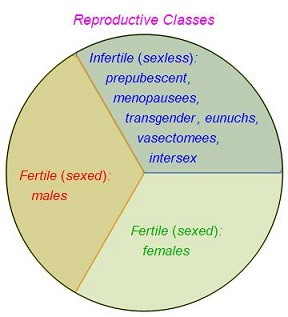






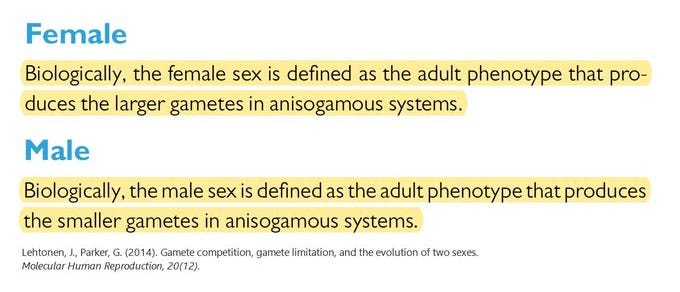


I understand your categorization. It's certainly simple enough. Males produce small gametes (a.k.a. sperm); females produce large ones (a.k.a. ova). Everyone else is "sexless." However, I'm not sure how useful those categories are. For instance, when it comes to bathrooms, would you say that a woman who has had her ovaries removed, or any menopausal woman, should not use the bathroom marked for women? Same question for changing rooms. Even in sports, while less often, this would still be relevant sometimes. Same for shelters for battered "women." What is the benefit of this particular categorization you are making? I'm sure it has some use, particularly when discussing things like birth control. However, I see it as a limited category with little value. There has to be a better way of defining "woman" and "man" than using whether they are actually able to produce ova or sperm. It would still be a biological definition, and I don't feel like coming up with the definition at this moment, but I now have some sympathy for Ketanji Brown Jackson. When this question was put to her, she indicated that she was not a biologist so she couldn't answer the question. Some mocked her, and I thought she was avoiding the question, but now I see that her answer was entirely appropriate. We need a sound definition that is useful, accords with our common sense and experience, and is based on biological reality. Simply using the actual production of sperm or ova is not it. Buy, hey, it was an interesting idea.
Up until the late 90s I sought to answer the question that Norbert Weiner posed, “What is the human use of human beings in technological society?” When I realized that’s the wrong question. The question should be “What is the human use of technology in human society?” Because we use things not people!